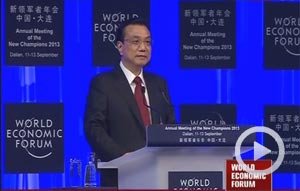Tailored sermons proposed
Updated: 2013-09-12 02:02
By Hou Liqiang and Zhao Yinan (China Daily)
|
||||||||
Change could help pastors serve believers from diverse backgrounds
China's top Christian authority is encouraging tailored and flexible sermons, as traditional ways of preaching may not answer the needs of rural believers migrating to cities.
Along with other migrant workers, a large number of Christians have moved to cities from rural areas amid rapid urbanization, said Elder Fu Xianwei, chairman of the National Committee of Three-Self Patriotic Movement of the Protestant Churches in China, one of the two major Christian associations in the country.
The trend has led to diversified demands from religious services in cities, especially during Sunday sermons, as parishioners are seeking different comforts.
China has seen an increase of 2.4 million baptized believers from 2008 to 2012. More than 1,000 pastors were ordained and more than 5,000 churches and meeting points were built in that time.
"While the number of urban Christian believers grows rapidly, the makeup of the population is also changing," Fu said in a working report on the National Chinese Christian Congress, the country's top Christian authority, which concluded on Wednesday.
He urged for more "diverse, tailored and flexible" sermons to be adopted, as more urban churches face the challenge of how to serve believers with different needs, including migrant workers, new urban residents, intellectuals and entrepreneurs.
Shan Weixiang, vice-chairman of the China Christian Council and a pastor in Ningbo, Zhejiang province, said almost a quarter of urban believers are migrant workers or new urban residents, based on questionnaires taken when giving baptisms.
Ningbo is known for its large migrant population, which accounts for more than 40 percent of its total urban residents.
Shan said most urban residents go to church mostly for "a lofty spiritual need", while migrant workers are seeking advice and comfort on everyday difficulties of life.
"Migrant workers and new urban residents are under great pressure, and they especially lack family warmth and help," Shan said.
Kou Xiaodong, a delegate from Gansu province, said migrant workers and new urban residents, who consider themselves at the bottom of society, often face misunderstandings or are treated as outcasts.
"They go to church in search of a sense of belonging, which differs a lot from the native Christians in cities," he said.
Kou said to preach separate sermons is one good way to meet the needs of different groups.
"If a pastor preaches similar information to all believers, some of them may be satisfied but others may not receive anything helpful," he said.
Churchgoers at Sunday services in Chongyitang, a church in Hangzhou, the provincial capital of Zhejiang, have increased from less than 2,000 in 2005 to about 10,000.
Gu Yuese, the pastor of the church, said one reason is that they offer tailored sermons and meetings to different groups.
In addition to holding two sermons with different content on Sundays, the church organizes meetings for different groups of people in the evenings.
"The content for both the sermons and meetings are prepared based on the age and personal backgrounds of the participants, since people from different groups lack a common language," he said.
Panshitang, a church in a development zone in Hangzhou where most parishioners are from other places, has tried to organize meeting groups according to the hometown of the migrant workers and new urban residents due to "provincialism", said pastor Hu Quanyuan.
"Different methods should be adopted in different situations."
The congress, held every five years and attended this year by 315 delegates from across the country, re-elected Fu as leader of the National Committee of the Three-Self Patriotic Movement of the Protestant Churches in China.
Gao Feng was also re-elected chairman of the China Christian Council.
Fu said China has one of the highest circulation figures for Bible distribution. An annual average of 3.5 million copies were distributed across the country over the past five years, while more than 62 million copies of the Bible were distributed from the resumption of worship by Chinese churches in 1979 to the end of 2012.

 Another iPhone4 explodes while charging
Another iPhone4 explodes while charging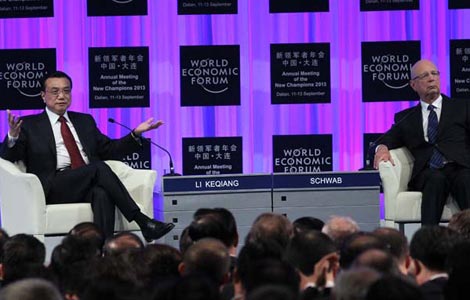
 Premier stresses transformation of the economy
Premier stresses transformation of the economy
 Soyuz capsule returns from space station
Soyuz capsule returns from space station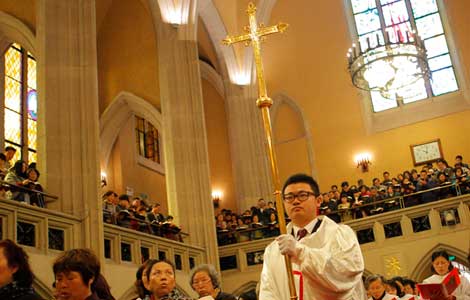
 China's Christian churches reduce leaders' age ceiling
China's Christian churches reduce leaders' age ceiling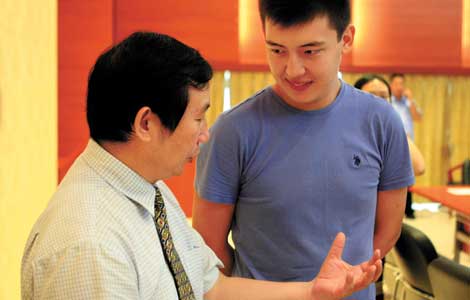
 Student's rare blood bonds Kazakhstan and China
Student's rare blood bonds Kazakhstan and China
 Apple's low-end phone price disappointing
Apple's low-end phone price disappointing
 US marks 9/11 anniversary
US marks 9/11 anniversary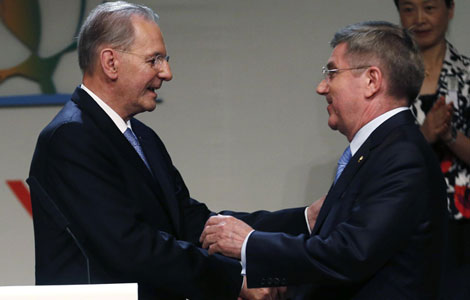
 German Bach elected as IOC president
German Bach elected as IOC president
Most Viewed
Editor's Picks

|

|

|

|

|

|
Today's Top News
Can China withstand global funds shifts?
China Daily Asia Weekly wins media award
Report questions US firms pursuing cloud computing in China
Reducing poverty gains momentum in Asia
China turns to US sorghum for animal feed
China's global firms face 'trust gap'
Li stresses transformation of economy
US delivers weapons to Syrian rebels
US Weekly

|

|
